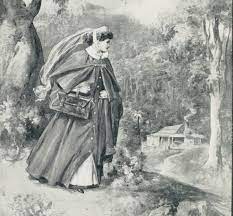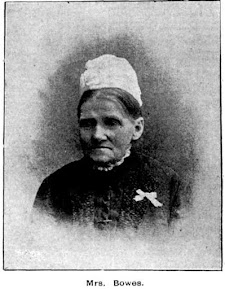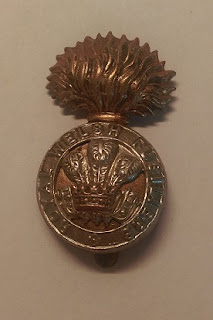Mothers - Part 1 - Nurses that nurtured
As we approach Mothers Day
I've been in a reflective mood about mothers in general. So much so that I have
decided to prepare this blog over two weeks; the first part as an ode to “mothers”
who may or may not have given birth but displayed the nurturing values we associate
with the best of mothers. The second part will be devoted to a mother whose
behaviour towards her “children” still sends shock waves through us today.
For today's blog I wish to
pay homage to two women who gave their lives to tend many.
ELLEN DAVIS BLACKER
Little is known of Ellen’s
early life, but she was born sometime around 1878 and was known as Ellen Davis
Willets.
Ellen arrived in Lake
Cargelligo in the Central West of NSW before the outbreak of WW1 and was a Bush
Nurse. At the time it was an isolated regional town and was one of the first
three centres in NSW to be served by a Bush Nurse. Nurse Willets settled in
well and by 1914 she had married John Blacker of a local pioneering family.
Bush nursing developed after
it was deemed necessary for trained nursing to be provided in remote areas to
assist with sickness and emergencies. This type of nursing first developed in
Tasmania and soon expanded to Victoria and other States.
The Bush Nurse’s major
activities were in midwifery and child health and her role was important as it
contributed to the outcomes of Federal Government programmes such as maternity
allowance, fitness campaigns and the improvement of standards in milk and
foodstuffs. They also provided first contact care as these areas had no
resident or often no visiting Doctor.
Ellen officially trained as
a midwife at the Women’s Hospital in Carlton Victoria and was registered on 4th
November 1926.
Originally the scheme aimed to
recruit older nurses who had to be able to rely on their own resources, ride a
horse and drive a buggy, have the physical strength to remain on duty for long
hours, be well trained and be independent practitioners by virtue of their
isolation. Not much to ask!
Nurse Blacker soon became
Matron Blacker and built the Juna Private Hospital in Lorne Street which was
next door to her residence. She ran the hospital for many years until she left
the district, and it was eventually taken over by the District Hospital.
John Blacker died in March
1932 is buried in Lake Cargelligo cemetery. They produced a daughter, Una, who became
a Doctor.
Ellen came to Sydney and
resided in Ashfield, dying in Summer Hill in 1978 in her 100th year.
She is buried in the Anglican area near the Anglican office.
Ellen Davis Blacker headstone - Author's own
Reads - Pioneer bush Nurse. Wife of late John Henry Blacker (interred Lake Cargelligo) Mother of Una.
FLORA MAY EWINGTON
Flora was born in 1883 in
Melbourne, Victoria, the daughter of William and Emily Ewington. She trained as
a nurse and enlisted on 16th July 1915 having previously served in
that position at the Liverpool Barracks for some 18 months. Her file states she
was 5’4” with a dark complexion, brown eyes and hair.
Nurse Ewington served in
Egypt and in the First General Hospital in Rouen France, dealing day in and out
with casualties presenting with numerous wounds of battle of varying degrees. Flora
was found to be suffering from asthma in May 1917 and took a week to recover. She
availed herself of leave in London on 13th December 1917 and then
transferred to England for duty from the 28th December that year. Flora
remained working there until the end of the war.
Flora Ewington returned to Australia on 21st January 1919 and was discharged from the AIF on 21st April 1919. She continued nursing, never married and died on 21st November 1958 in Mosman, Sydney, NSW.
She lies in the Old Anglican
are few minutes' walk from Ellen Blacker. Her grave is marked with an older style
Commonwealth Ware Commission plaque.
Many nurses never recovered from
the physical and emotional stresses of wartime service.
The experience of working
during the war gave many nurses new confidence in their abilities and skills.
During the war, some received training and opportunities to perform roles
previously reserved for men, such as surgery and administering anesthetics.
Both Ellen and Flora during
their lives of devotion to the service of others, showed the best of qualities
we regard in those we call “mother” that is the nurturing of their charges.
Rest in Peace Ladies.
I have referenced Ancestry.com,
Trained Nurses Association website, Trove newspapers, NAA& AWM files.
For all the mothers …..Have
a Very Special Day this coming Mothering Sunday.
If you have any comments, please
place them below or at the Facebook group page found via a search of rookwoodcemeterydiscoveries.
Or
Simply send me an email at
Until next week - when I
flip the coin and produce a story about an infamous mother.







Comments
Post a Comment